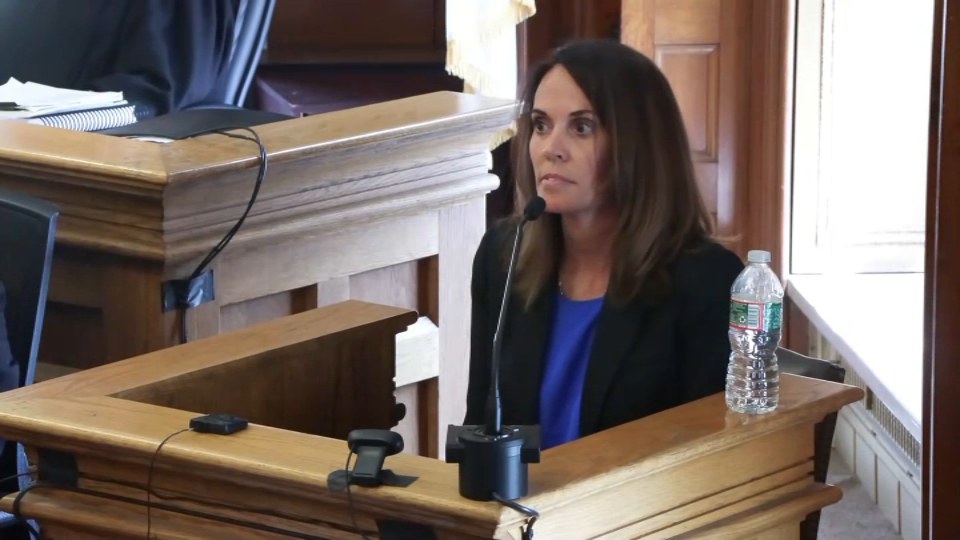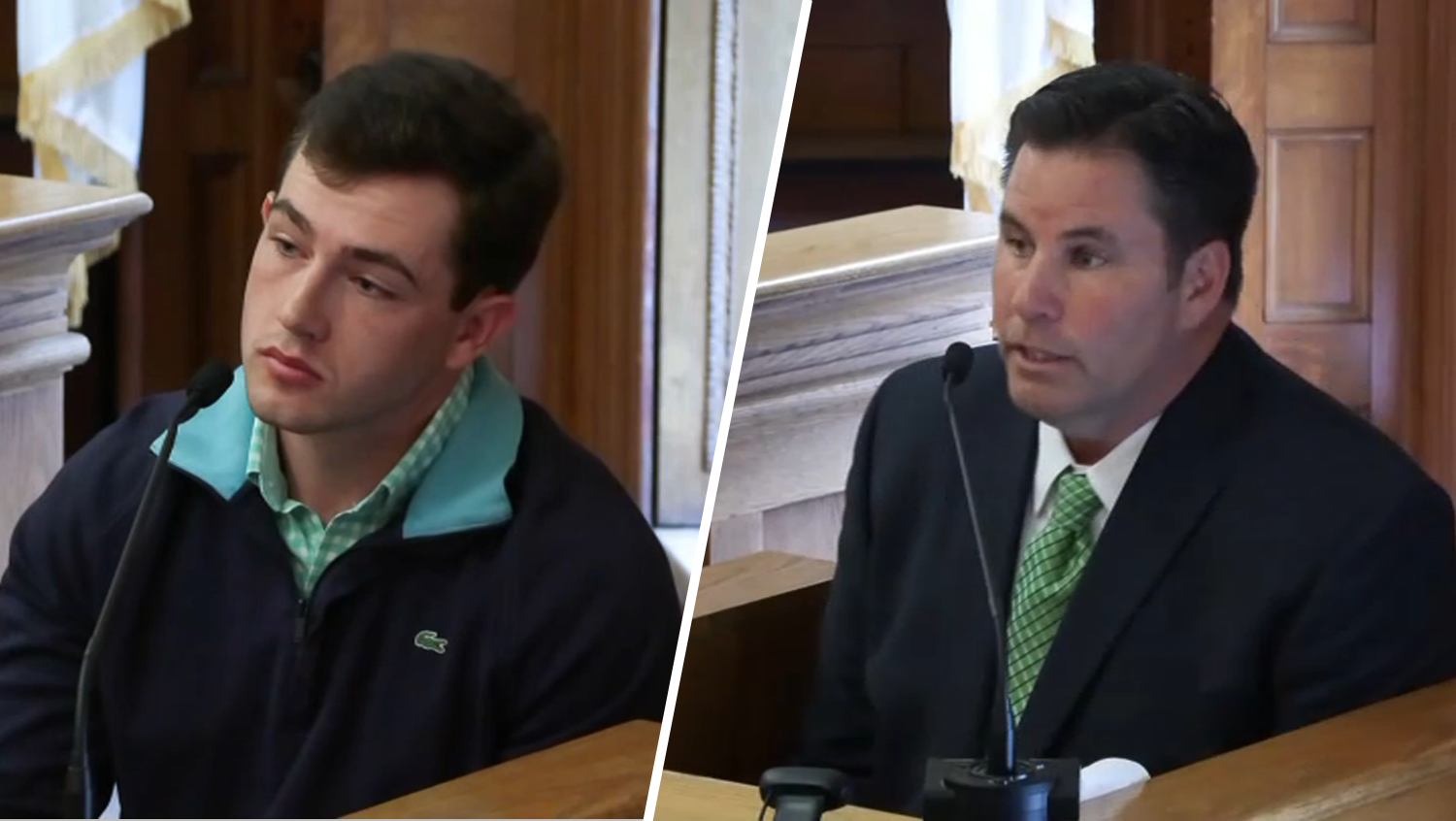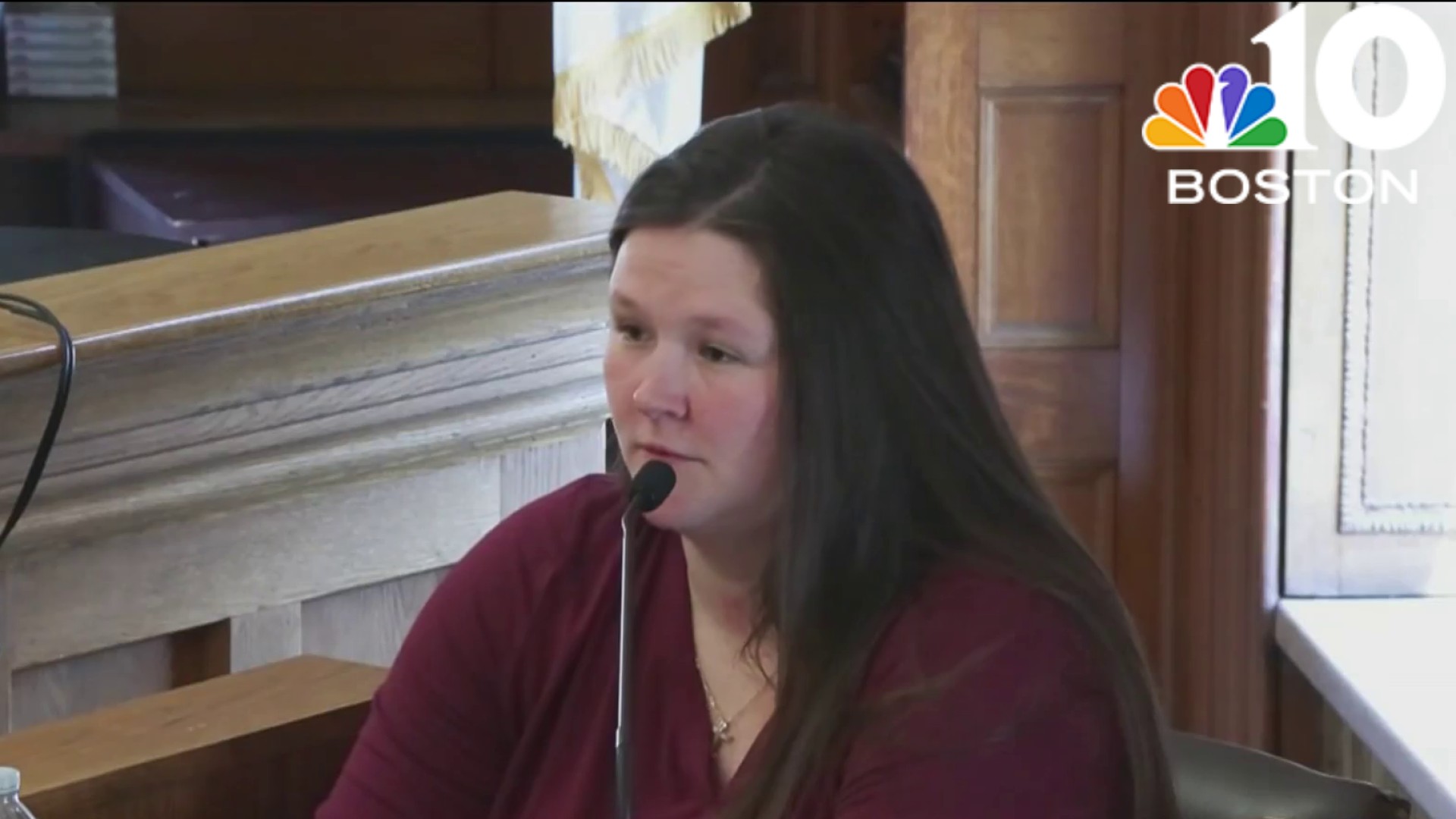Jennifer McCabe returned to the stand in the murder trial against Karen Read, with the defense questioning her for more than three hours about the circumstances surrounding the death of John O’Keefe.
Week four of testimony began Tuesday in the Karen Read trial with a key witness, Jennifer McCabe, back on the stand, for what quickly turned into a heated cross-examination.
Read's lawyer focused his first set of questions for McCabe largely about what she witnessed in the moments when Read dropped off her boyfriend, Boston Police Officer John O'Keefe, at McCabe's sister's house in Canton, Massachusetts, then hours later, when O'Keefe's body was found in the snowy lawn the morning of Jan. 29, 2022.
WATCH ANYTIME FOR FREE
>Stream NBC10 Boston news for free, 24/7, wherever you are. |
Read, 44, of Mansfield, has been charged with second-degree murder, among other charges, in the death of O'Keefe, 46, her boyfriend. She has pleaded not guilty and is free on bond. The 16-year police veteran was found unresponsive outside the home, owned by McCabe's sister and brother-in-law, a fellow Boston police officer.
Get updates on what's happening in Boston to your inbox. Sign up for our >News Headlines newsletter.
Watch the Karen Read trial live on nbcboston.com, NECN, NBC Boston streaming platforms (including Roku, Peacock and Samsung TV) and NBC10 Boston's YouTube page. Every night of the trial at 7 p.m., come back for analysis and more.
Email questions to canton.confidential@nbcuni.com.
In court last week, McCabe testified, "Ms. Read stated she had hit him." But defense attorney Alan Jackson on Tuesday presented McCabe with grand jury testimony she gave in 2022, asking where McCabe testified at the time that Read stated she hit O'Keefe.
McCabe testified, "I can tell you today, with 100% clarity, she said, 'I hit him, I hit him, I hit him,' on that morning," and said it was one of the most powerful pieces of testimony she gave. But she acknowledged that her recollection in 2022 of what Read said was in the form of questions: "Could I have hit him? … Is he dead?"
Outside of court Friday, Jackson said he was looking forward to cross-examination: "There are more holes in her story than a fishing net, so I will focus on all the holes."
And while the defense team had told NBC10 Boston they planned to ask more questions — about a now-infamous Google search on McCabe's phone, "Hos long does it take to die in the cold?" — that line of questioning didn't come up Tuesday.
McCabe was at the home the night before O'Keefe's body was found, but told the prosecution she was asked to do the search by Read after the pair found O'Keefe's body. The defense says somethings not adding up.
"That Google search was at 2:27 in the morning, that is when the Google search happened, you will find out why we know that in short order," said Jackson.
'Where was the body?'
Jackson opened the cross-examination by asking, "Family is important to you, is it not?" before, establishing that neither O'Keefe nor Read are McCabe's family.
Jackson turned to the Waterfall, the Canton bar where McCabe and others spent time with O'Keefe and Read the the night before his death. McCabe, like other witnesses who've testified in the trial, said she didn't see any tension between the couple that night, though she said she hardly interacted with them together that night.
Jackson played surveillance video from outside the bar in which McCabe identified O'Keefe and another person, apparently Read, following McCabe into the night around 12:10 a.m. Jackson pressed McCabe on an invitation she extended to Read, along the lines of "you're coming with me," and whether she was trying to separate Read from O'Keefe, which McCabe denied.
"It was innocent," McCabe said, after explaining she believed both O'Keefe and Read were expected to go back to the home on Fairview Road together.
Jackson's questions jumped ahead to the home, where several other people — many of whom have already testified — were already gathered.
The lawyer asked McCabe about McCabe's previous testimony to investigators on the location of a Jeep in the driveway of the home, and he raised the first of several purported inconsistencies between that previous testimony and McCabe's current recollection. In this instance, McCabe said the lead state police investigators, Trooper Michael Proctor, took down the wrong orientation of the Jeep.
"I told him that when I looked out the front door, the car was straight ahead, and yes, it was facing out," McCabe said.
"So Trooper Proctor is wrong about what you said?" Jackson replied.
"I 100% said it was straight out the front door," she said.
The location of the vehicles in the driveway has been important in the investigation and trial because it helps establish when Read's SUV, which had O'Keefe inside, was outside the home.
Albert returned to the vehicles after establishing some other information — whether she speaks with other family members tied up in the case about it, what she knew about a location-tracking app called Life360 that's been involved in the case, her lack of memory of her sister's dog being at the Alberts' Fairview Road home when she returned.
Jackson asked McCabe to verify that, in her grand jury testimony, she did not mention a Jeep being in the yard.
"I may not have been asked about the Jeep so I did not mention the Jeep," McCabe eventually said, after some back and forth about reviewing the transcript.
McCabe denied several questions insinuating she checked her story with other witnesses'.
Jackson turned to several text messages McCabe sent to John O'Keefe's phone early that morning, including one at 12:27 a.m. McCabe said she sent that text when she saw Read's SUV outside, and that she knew that for the first two of the texts, she walked to the door of the home to look out at the vehicle.
"When I first saw the vehicle, it was straight ahead, out the front door, stationary," McCabe said, noting she later saw it move twice.
Jackson pointed out that seeing it move twice would mean that McCabe had looked out the window at least three times, first to see the SUV stationary, then two more times to establish the SUV had moved.
McCabe confirmed "I had a clear view of Karen's vehicle outside," and that she noticed the SUV was gone by the time she sent a 12:45 a.m. text. She agreed she didn't see or hear anything out of the ordinary through the time the SUV drove away.
"Where was the body?" Jackson asked, pointedly.
"I have no idea," McCabe replied. "I'm assuming the body was on the front lawn."
"You were looking at the front lawn, weren't you?" the lawyer said.
"I was looking at the vehicle," McCabe said.
There was a testy back-and-forth about McCabe's field of vision, but McCabe eventually confirmed, "I never saw a body," adding, "I wish I had."
Was 'I hit him' a question or a statement?
Jackson moved ahead a few hours to pre-dawn, when Read had gathered McCabe and another friend, Kerry Roberts, to help find O'Keefe, who hadn't turned up at his home that night. Jackson focused on another purported inconsistency between McCabe's testimony in court and to the grand jury that charged Read.
McCabe is one of the witnesses who says that, at the scene, Read repeatedly stated, "I hit him," but Jackson asked McCabe to point in the transcript of her grand jury testimony where she said so.
McCabe replied that she didn't think it was in there, but continued, "I can tell you today, with 100% clarity, she said, 'I hit him, I hit him, I hit him,' on that morning."
Jackson suggested that the grand jury transcript shows McCabe saying 12 different times that Read asked if she'd hit O'Keefe, phrases like, "Could I have hit him?" and "Is he dead?"
McCabe denied changing her testimony to help her story.
Focus on several phone calls
Jackson played a 911 call made in the morning, on which McCabe recognized herself saying, "he got out of the car," a phrase the lawyer focused in on, asking how she knew that.
"I did, because Karen Read had told me she had left him there," McCabe said.
That call was made before McCabe went inside the house — she's testified that she ran into her sister and brother-in-law's bedroom to wake them up — and Jackson asked about two subsequent calls McCabe before going in the house, to her sister.
"She did not answer," McCabe said, to which Jackson replied that her phone extraction shows the call was answered.
"If that's what it shows," McCabe agreed, but insisted that her sister didn't answer.
After a break, Jackson played audio from a call to O'Keefe's phone that went to his voicemail. The caller's phone was inside an SUV — its windshield wipers were audible, as well as Read screaming in the background and other muffled voices.
They returned to the issue of the calls to McCabe's sister, Nicole Albert, each a few seconds long and a minute apart, according to phone records.
"The calls to Nicole were deleted from your phone before you turned your phone into law enforcement, right?" Jackson said.
"Not by me," McCabe replied.
Jackson continued pressing her on the call records, including one to Brian O'Keefe, but McCabe said it was hard to remember some specifics, given the "hysterical scene."
"My friend was lying there on the ground," she said.
'I sat with my family in shock and horror'
Jackson started a new line of questioning, asking how many of the officers who responded to the Fairview Road home McCabe would friends with. She said she was friendly with Lt. Michael Lank and knew of Sgt. Sean Goode and acknowledged knowing both were friends with others in the Albert family.
McCabe insisted the family never discussed what they would tell police, and denied that her brother-in-law Brian Albert, who also owned the Fairview Road home and was also a Boston police officer, gave her advice about what to say in her interview.
"I'm an honest and truthful person," McCabe said at one point.
She didn't recall whether she told Brian Albert which officers were outside when she woke him and her sister up that morning.
Jackson went through the friends and family members who came into the house on Fairview Road in the hours after O'Keefe's body was found.
"I sat with my family in shock and horror," McCabe said.
Jackson asked whether McCabe and others were allowed to discuss what took place without police present, leading to another contentious back-and-forth, but McCabe acceded.
However, she replied, "You're creating a scene that didn't happen."
She later explained, "Everybody was trying to figure out what had happened," discussing.
Jackson moved on to another purported change in McCabe's testimony, having to do with Read's broken taillight — shards found at the scene days later are part of the evidenced against her. Jackson asked if McCabe said she saw a crack in the taillight during the search for O'Keefe that morning.
"That's what he said I said," McCabe replied. "I'm telling you, I told him, 'It was cracked.'"
When Jackson asked if the investigator again "screwed it up," McCabe said, "You'd have to ask Trooper Proctor."
McCabe said that in another report she said the taillight was cracked and had pieces missing.
"In a state of shock, that was my description," she said. "I said it was cracked, I never said there was a crack in it."
Call and text records
Jackson turned to reports listing the phone calls extracted from O'Keefe's phone and McCabe's. O'Keefe's phone showed calls from McCabe that her phone didn't, according to Jackson, who asked the witness if every call in question was deleted.
"I didn't understand that report, and I'm not an expert," McCabe replied.
She denied deleting the call logs when Jackson asked if McCabe "sanitized your phone because you didn't want the police to know" about incessant calls that morning.
McCabe did say she deleted, with investigators' permission, personal conversations she had with her daughters.
"Did you delete any phone calls?" Jackson asked.
"I do not recall deleting any phone calls at all. I would have no reason to delete anything," McCabe replied, denying deleting calls with any witnesses in the case.
Jackson asked McCabe about her a text her husband testified about sending a group chat with her and several others involved in the case. In it, he said, "Tell them the guy never went in the house," which he said was in reference to O'Keefe and a reporter covering the story that morning.
McCabe said she didn't understand her husband to be directing her to coordinate their story.
"John never went in the house. It wasn't a story, it was the truth. It is the truth," McCabe said.
"Just like when you said, 'I hit him,'" Jackson replied, referring to McCabe's insistence that Read admitted hitting O'Keefe at the scene.
"Yes," McCabe said.
Jackson dug deeper into what McCabe and Roberts did in the hours and days to come.
McCabe said that Roberts asked to collaborate on a timeline of the events that unfolded: "The two of us were trying to figure out what had happened with our friend."
Roberts was later interviewed by police at McCabe's home, with McCabe present, she confirmed. Two officers came over when Roberts was there and the officers talked.
McCabe denied listening to the conversation or directing Roberts' testimony.
Jackson asked about a text McCabe sent to her family's group chat, "She's telling them everything." McCabe replied that she was listening to the phone call and mortified her to hear personal details.
"I was horrified," she said.
Jackson pointed out that McCabe had previously given different testimony to investigators, to which McCabe said her memory had been jogged.
And the lawyer latched on to whether McCabe could really hear what Roberts was saying in her police interview — she'd previously said the voices were muffled.
"You can hear bits and pieces. Was I eavesdropping? No. Was there some big coverup story? No." McCabe said.
Jackson continued to press McCabe — the judge had already sustained an objection to his question on whether McCabe's previous comment about not hearing the interview was a lie.
"You consistently reported back to the group how Kerry Roberts was doing, didn't you?" Jackson said.
"I would update them," McCabe replied. "We were all trying to figure out what had happened to John."
Jackson closed out the day's cross-examination with questions on a few more topics, including a meeting between Roberts and Lank, the police investigator, on Jan. 30.
Jackson asked if McCabe sat with Lank's wife in the car for 45-60 minutes.
"Kerry [Roberts] dropped her daughter off, the wife came out," McCabe said. "Kerry is a talker. They started talking. A tragedy had happened the day before."
She disputed Jackson's characterization of the meeting as "off the books," saying it was just for Roberts dropping her daughter off at the home of a good friend, whose husband was a police officer in Canton.
McCabe did acknowledge initially denying the meeting when first asked about it by a state police investigator, then re-thinking it.
She also noted that they drove by the Fairview Road home where O'Keefe died on the way to Lank's house, and while Jackson said a report showed they stopped at the home, McCabe said they did not stop or pick up her sister.
Finally, Jackson listed the calls McCabe made to O'Keefe from 12:14 to 12:50 a.m. the morning of his death, citing his phone records, and noting the first two were picked up, but the last six weren't.
The lawyer pressed McCabe about an explanation McCabe previously gave investigators involving butt dials, noting that when someone butt dials someone else, the call goes to voicemail.
"There were also text messages I was sending," McCabe said.
Jackson's last questions, about the period of those final phone calls coinciding with the period when O'Keefe was fatally hurt, were objected to by the prosecution and sustained.




